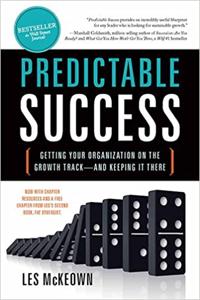
Want to learn the ideas in Predictable Success better than ever? Read the world’s #1 book summary of Predictable Success by Les McKeown here.
Read a brief 1-Page Summary or watch video summaries curated by our expert team. Note: this book guide is not affiliated with or endorsed by the publisher or author, and we always encourage you to purchase and read the full book.
Video Summaries of Predictable Success
We’ve scoured the Internet for the very best videos on Predictable Success, from high-quality videos summaries to interviews or commentary by Les McKeown.
1-Page Summary of Predictable Success
Overview
This is similar to the Wizard of Oz, in which Dorothy and her friends travel down a yellow brick road. However, they encounter many dangers along the way. This is true for companies as well; most fall back somewhere on their journey toward success.
These key points will help you navigate the perilous path to predictable success. It’s difficult to get there, but just as hard to stay relevant and dynamic. If you want to reach your goals, read on.
In this article, you’ll learn how to navigate the dangerous business rapids known as whitewater. You’ll also learn how to grow a business while still allowing employees space for innovation and why it’s bad when a CEO has too much on his or her plate.
Big Idea #1: Any company can consistently meet its objectives – regardless of size, age or finances.
Business is competitive. For many companies, success or failure depends on luck. No matter how good your idea may be, it’s impossible to predict how customers will respond to it upon execution. Wouldn’t it be nice if you could achieve predictable success without being in business for decades? You can do that by setting goals and consistently meeting them.
Little & Co. is a credit-card payment processing company that has been successful for only five years, but it’s already in the same league as SC Johnson, which was founded 120 years ago.
Money and age are not reliable predictors of success. Microsoft has billions in reserve, but it doesn’t consistently meet its goals; meanwhile, the small graphic design firm I work with never falls short of its annual targets. So, if money and age don’t lead to predictable success, what does? The answer is management. Managers who have a strong vision and stick to their plan will help their companies achieve predictable success. These leaders stay calm when problems arise and figure out the best way to deal with them based on past experience or by learning from others’ experiences.
When a stone falls into running water, it doesn’t react much. It just flows with the current and goes along its way. This is a good metaphor for management because you should be calm and unemotional when your employees screw up or have bad news to tell you. Don’t overreact; instead, respond calmly without any drama involved so that things can go back to normal quickly.
In this article, we’ll show you how companies can learn to be more like running water and achieve predictable success.
In the following key points, we’ll show you how companies learn to embody running water and achieve predictable success.
Big Idea #2: There are three stages on the path to predictable success, beginning with “early struggle” and “fun.”
No company can be successful without a process. There are many challenges in each stage of the process, but if you get through them successfully you’ll have a great chance at success.
A company will struggle when it first starts. This is the early stage of a business, and it requires you to solve two simple problems.
Are there enough people who want my product? Do I have enough money to pay my bills?
It is important to have enough cash on hand so that businesses can advance to the next stage. However, most companies fail to do this and don’t move forward. The 20% of companies that manage this are in an elite group. They know how much money they need as a minimum for their business model, and they ensure that they have three times more than what’s needed.






